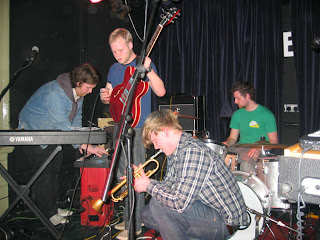Das Pop, playing at the O2 Arena, held no pull for me. A small indie gig at one of my favourite pubs was more my kind of thing. Wired from weed, several cups of coffee and a pre-listen of the band list on myspace, my photographer and I were ready, if a little uncertain what to expect. For the moment, we were ignorant of what was to come. We were out for a good time after all, and to check back into the local scene.
I had been invited by Graeme Murray, the drummer of the brilliant upcoming Oxford band
Youthmovies. He was my contact for the evening and my only link to the social mess we unearthed. A small, soft spoken guy, unassuming in appearance, his ability at the drum-kit is undisputed. Two well known bands, Youthmovies and
Jonquil, were to join forces as
Vertical Montanas and headline the night; they had attracted quite a crowd.
Our curse as outsiders - my photographer and I never really felt welcome. They seemed to us to be a distant group. The new Indie Oxford wave is a different breed altogether. Fortunately, the music made up for the crowd and their perpetual blank, staring eyes. Navel-gazing and pretentious they stood like dead trees swaying to themselves. I attempted to arouse my photographer into a fighting frenzy, set him loose and see what would happen, all for the sake of bringing some excitement to a sedated atmosphere. Where was the beautiful chaos? If a bomb went off on stage, or one of the band members blew their own head off with a shotgun, these people wouldn't even raise an eyebrow. I was itching for a cattle prod.
The biggest, overall disappointment was missing Lee Riley, or better known as Euthedral, a one man electronic army. Shunned to the early evening slot, no doubt the audience wasn't interested. After hearing a couple tracks on his myspace page I was hooked. Sounding like Kevin Sheilds crossed with Nine Inch Nails while drawing from Sunn O))) and Godspeed You! Black Emperor,
Euthedral bellows forth heavy static doom-drones in intriguing variation and colour. Occasionally, out of the overbearing darkness, there appear subtle melodies like lights in a fog. Moments cycle between an orchestra breaking the sound barrier and the primal howling of a god-like machine or mythical beast. I could only hope he offended as many indie kids as was humanly possible.

Witnessing it first hand however, it was not to be and we ended up arriving just before the last two bands. I bought a pint and we squeezed to the front. The second-to-last group strolled on. Reminiscent of 65 Days of Static and Minus The Bear, but with half the available instrumentation, they were an impressive trio. Cascading melodies and intricate quick-fire guitar duets, it went down like firey whiskey. Tempo and texture were suficiantly explored but I felt they could have done more with their choppy rhythms - a minor point, it was elegant and promising Smart-Rock.

When they finished, I asked a bystander who the band was. I couldn't recognise them from what I'd heard on myspace. He stumbled over the pronunciation.
"I think they're called he-red-ra? hred-da?"
Ahh
Hreda, the name was confusing, common of many new bands. Sure, you can be all flavours of awesome, but creating new words in the English language can be arrogant and alienating to your audience.

My photographer had had his fun with taking pictures and crept to the corner to moan and pout about the clientele. The stage was being reprepared, pedal lights were blinking like a Christmas tree. With two drum kits already set up, this wasn't to be a typical set. By doubling up two bands and the band members, there by making a force of eight, it allowed those performing to relax and concentrate on a minimal, layered approach. Building a slow evolution of sound from one movement to the next, it was easy to loose yourself in the warm-sunlight tone but then be jostled back by jarring cross rhythms. The music took on the feel of a zoetrope, spinning grainy images around and around. They drew attention from Yannis Philippakis, the lead wizard of Foals. He had come possibly for the very same reason we had.
On seeing him, my photographer whispered casually in my ear.
"I want to hurt him" he said and downed the remainder of his drink.

He hates his voice you understand, and my photgrapher is a man who can be driven off the hindge over of the smallest things: boils, dirty socks, the scratching sound of wet sand. It's best to leave him be in these situations, trust me.
Despite the boredom, it was worth attending. For both bands, Vertical Montanas was a side project that displayed their improvisational capabilities as active and prominant musicians. If I had to draw a comparison between each band (difficult due to the overall variation) it would be their similar emotional goal, they were all striving towards the same sense of the 'sublime'. By stretching their materials and avoiding pigeon hole’ing, they are taking ground and putting up a flag for Oxford. My photographer however could not get over the dull, unwelcoming atmosphere. We felt trapped. The chaos we'd longed for earlier on seemed like the last thing we wanted now. Simultaniously, we both made the decision to escape into the medieval ally ways. We ended up talking shit to a chip van man and an attractive social worker girl who seemed far too interested in what we, two drunk and stoned fools, were both up to. Suspicion took hold. Even the usual gauntlet of Big Issue sellers frightened me. "We must get out of town immediately!" I thought, and my photographer and I ran for my house like children avoiding some horned devil.

(© Copyright 2009 Brendan Morgan)








